Related Research Articles

The Umbrellas of Cherbourg is a 1964 musical romantic drama film written and directed by Jacques Demy, with music by Michel Legrand. Catherine Deneuve and Nino Castelnuovo star as two young lovers in the French city of Cherbourg, separated by circumstance. The film's dialogue is entirely sung as recitative, including casual conversation, and is sung-through, or through-composed, like some operas and stage musicals. It has been seen as the second of an informal tetralogy of Demy films that share some of the same actors, characters, and overall atmosphere of romantic melancholy, coming after Lola (1961) and before The Young Girls of Rochefort (1967) and Model Shop (1969). The French-language film was a co-production between France and West Germany.
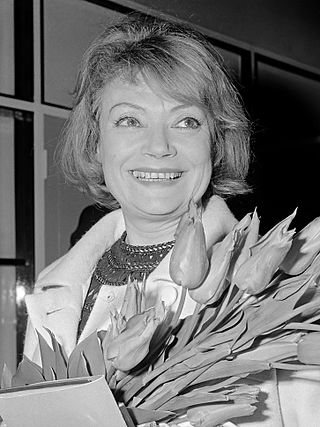
Yelizaveta Nikolaevna Kedrova, known as Lila Kedrova, was a Russian actress of the screen and stage. She won the Academy Award for Best Supporting Actress for Zorba the Greek in 1964, and the Tony Award for Best Featured Actress in a Musical for the same role in the musical stage version of the film in 1984.
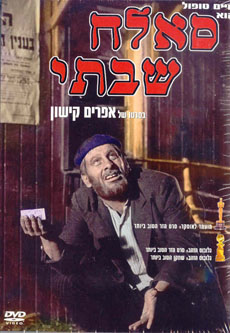
Sallah Shabati is a 1964 Israeli comedy film about the chaos of Israeli immigration and resettlement, as well as the issues Mizrahi Jews faced in the developing Israeli society. This social satire placed the director Ephraim Kishon and producer Menahem Golan among the first Israeli filmmakers to achieve international success. It also introduced to audiences to actor Chaim Topol, who would later achieve even greater recognition with the 1971 American period musical film Fiddler on the Roof.

Mel Stuart was an American film director and producer who often worked with producer David L. Wolper, at whose production firm he worked for 17 years, before going freelance.
Edward Anhalt was an American screenwriter, producer, and documentary filmmaker. After working as a journalist and documentary filmmaker for Pathé and CBS-TV, he teamed with his wife Edna Anhalt, one of his five wives, during World War II to write pulp fiction.

Irvine "Cotton" Eugene Warburton was an American college football quarterback (1933) who became a film and television editor with sixty feature film credits. He worked for the Metro-Goldwyn-Mayer Studios and for the Walt Disney Studios, and is probably best known for his Academy Award-winning editing of Mary Poppins (1964).
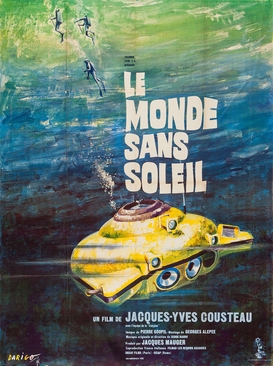
World Without Sun is a 1964 French documentary film directed by Jacques-Yves Cousteau. The film was Cousteau's second to win the Academy Award for Best Documentary Feature, following The Silent World in 1956.
The 37th Academy Awards were held on April 5, 1965, to honor film achievements of 1964. The ceremony was produced by MGM's Joe Pasternak and hosted, for the 14th time, by Bob Hope.
Battle for Life is a nature documentary series made from 1932 until 1934 by Horace Woodard and Stacy Woodard, The short films include the 1935 Oscar award-winning City of Wax, about honey bees. The one-reel short films were released by Educational Pictures. A homemade camera setup for closeups was used. The Woodards followed the series with another series titled Struggle to Live.
Nine from Little Rock is a 1964 American short documentary film directed by Charles Guggenheim about the Little Rock Nine, the first nine African-American students to attend an all-white Arkansas high school in 1957.
To Be Alive! is a 1964 American short documentary film co-directed by Francis Thompson and Alexander Hammid. The film is notable for its use of a multi-screen format and for winning the Oscar for Documentary Short Subject at the 38th Academy Awards.
The Human Dutch is a 1963 Dutch documentary film directed by Bert Haanstra, about the daily lives of people in the Netherlands. It was a big success in the Netherlands with almost 1.7 million admissions, the third most successful Dutch film at the time. It was nominated for an Academy Award for Best Documentary Feature. It was also selected as the Dutch entry for the Best Foreign Language Film at the 37th Academy Awards, but was not accepted as a nominee.
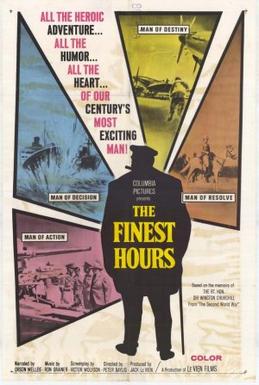
The Finest Hours is a 1964 British documentary film about Winston Churchill, directed by Peter Baylis. It was nominated for an Academy Award for Best Documentary Feature.
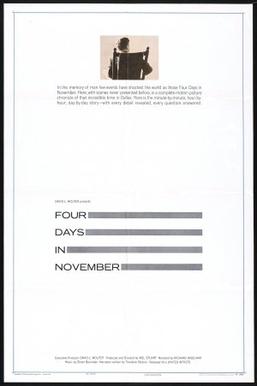
Four Days in November is a 1964 American documentary film directed by Mel Stuart about the assassination of John F. Kennedy. It was nominated for an Academy Award for Best Documentary Feature.
One Hundred and Forty Days Under the World is a 1964 New Zealand short documentary film about Antarctica. It was nominated for an Academy Award for Best Documentary Short.
Children Without is a 1964 American short documentary film directed by Charles Guggenheim, about a young girl and her brother growing up in the housing projects of Detroit. It was nominated for an Academy Award for Best Documentary Short, losing to another film by Guggenheim, Nine from Little Rock. Children Without was preserved by the Academy Film Archive in 2016.
Eskimo Artist: Kenojuak is a 1964 Canadian short film about Inuk artist Kenojuak Ashevak, directed by John Feeney and produced by the National Film Board of Canada (NFB). It won the BAFTA Award for Best Short Film in 1964 and, in 1965, was nominated for the Academy Award for Best Documentary Short Film.
The Legend of Jimmy Blue Eyes is a 1964 short film directed by Robert Clouse.

Carson "Kit" Davidson was an American filmmaker, writer, and editor. His filmmaking career spanned four decades, during which he made more than a dozen short films, two of which were nominated for Academy Awards.
Help! My Snowman's Burning Down is an American short film made by Carson Davidson in 1964, with music composed and performed by Gerry Mulligan. The film was nominated for an Academy Award for Best Live Action Short Film.
References
- ↑ "New York Times: Casals Conducts: 1964". Movies & TV Dept. The New York Times . 2011. Archived from the original on May 20, 2011. Retrieved May 22, 2008.
- ↑ "The 37th Academy Awards (1965) Nominees and Winners". oscars.org. October 5, 2014. Retrieved June 1, 2019.
- ↑ "Preserved Projects". Academy Film Archive.